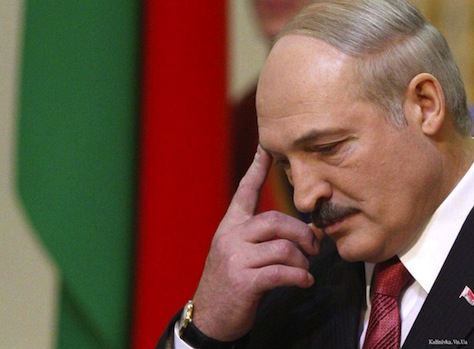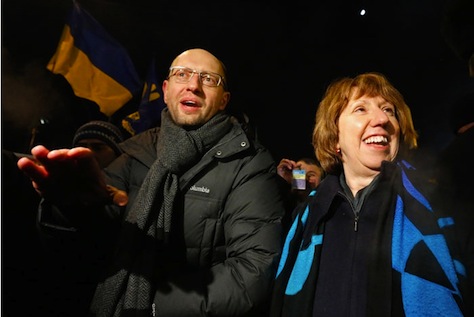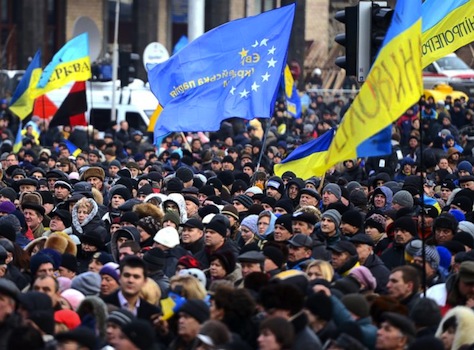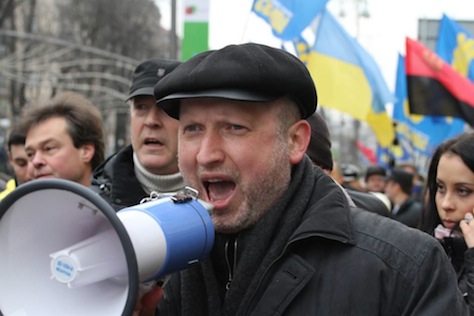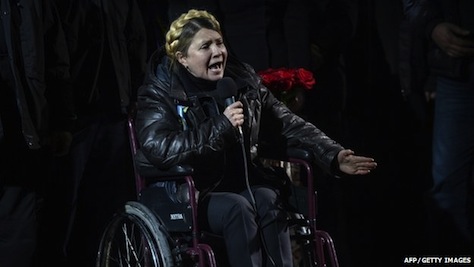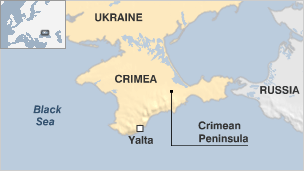An aggressive, autocratic Russia to your east, and a democratic, liberal Europe to your west. What’s your poor everyday post-Soviet European Stalinist dictatorship to do?![]()
As Russian forces took control of Crimea from Ukraine last month, and as Russian troops menacingly massed along the eastern Ukrainian border, no country has a greater interest than Belarus, which lies immediately to the north of Ukraine and immediately west of Russia.
And no world leader has a greater worry than Belarus’s president since 1994, Aleksandr Lukashenko (pictured above). It’s hard to know just which must be more harrowing for Lukashenko — watching pro-European protestors depose Ukrainian president Viktor Yanukovich in February, or watching Russia blithely annex Crimea in March.
At first glance, Belarus appears like the strongest of Russian allies. It’s already long been a member of the customs union with Russia and Kazakhstan that Putin hopes to expand into the Eurasian Union. The country sends 35% of its exports and receives 59% of its imports from Russia (oddly, perhaps, the second-most important market for Belarusian exports is The Netherlands, which receives 16.5% of all exports).
Growing divisions between Moscow and Minsk
But as Andrew Wilson wrote last month for Foreign Affairs, Lukashenko may be edging away from the Kremlin:
It should not be surprising that Lukashenko has been demonstrably edging away from Putin in recent weeks. Belarus has started hinting that it wants better relations with the EU, agreeing in February to participate in visa negotiations with Brussels. But any shifts toward the EU are going to be a gradual process; Lukashenko is still a dictator, after all, who has little interest in meeting Europe’s democratic standards. For now, Lukashenko is inside the Russian tent looking out. And he is not about to head for the door just yet. But ever since Putin’s aggressive takeover of Crimea, Lukashenko has been more anxiously looking toward the exits.
That’s one reason, perhaps, why Lukashenko didn’t send observers to Crimea for the March 16 referendum on annexation, and why Belarus hasn’t formally acknowledged Russia’s annexation.
It’s also why, despite hosting Russian air force and other military assets, Lukashenko has gone out of his way to rule out sending any Belarusian military forces into Ukraine. Lukashenko met with Ukraine’s interim president Alexander Turchninov over the weekend for talks, and he went out of his way to emphasize strong relations:
“You shouldn’t view us not only as foes or competitors, you shouldn’t even think in those categories,” Lukashenko went on. “You should be sure to know that we’ve been treating you as our closest relatives even in the years when there existed misunderstandings.” He hailed the fact that “we are not looking at each other askance”. “We really spent a lot of years building up a belt of good-neighborliness and we’re not ready to destroy it today and there’s no need in eliminating it.”
Lukashenko stressed the importance for each Ukrainian to know in this connection that “our border is a border of friendship and not a border of division.”
“You shouldn’t apprehend any unfriendly cravings on the part of Belarusians here because neither we nor you need it,” he said.
Though we shouldn’t rule out the notion that Lukashenko represents a quiet, back-door channel for negotiations between Kiev and Moscow, there’s also no reason to doubt that Lukashenko’s remarks are legitimate.
If Russian president Vladimir Putin really thinks that Ukraine isn’t truly a sovereign country,** he almost certainly holds the same view of Belarus. Just as Ukraine is called ‘little Russia,’ Belarus literally means ‘White Russia.’ Long before it became an independent country in 1991 (and before the Soviet Union, briefly, as the Belarusian People’s Republic), the area that comprises what is today Belarus have been known for centuries as ‘White Russia.’ Continue reading With Ukraine crisis, Lukashenko between a rock and a hard place
